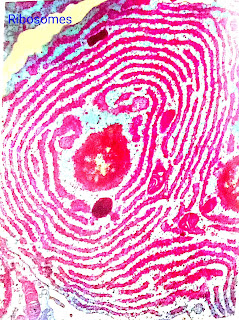Ribosomes were discovered by Palade in 1955. Ribosomes are small dense organelles, about 20 nm in diameter present in great numbers in the cell. Most are attached to the surface of RER but they can occur free in the cytoplasm
Ribosomes are a combination of rRNA and protein. Eukaryotic ribosomes are compose of an equal quantity of RNA and protein. Hence they are also called as ribonucleo proteins.
Ribosomes are involved in protein synthesis. They assemble amino acids in the right order to produce new proteins. The ribosome uses the code on' messenger RNA (mRNA) to put amino acid together in chains to form specific proteins therefore know as protein factories
Generally proteins that are to be used inside the cell are made on free ribosome while those that are to be secreted out of the cell are made on ribosomes that are bound to ER membranes.
New ribosomes are formed in the nucleolus.
Eukaryotic ribosome is 80 S (60 S + 40 S). Mg++ controls this attachment while Prokaryotic cells are 70S (50s+30s)
A group of ribosomes attached to the same mRNA are called polysomes.
Nucleolus is a factory of ribosomes while ribosomes are the factory of protein synthesis
